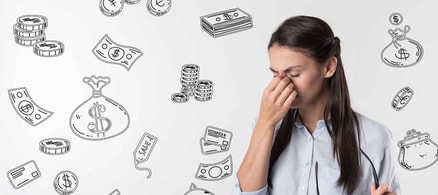Secret debt
Cassandra and Aldo, 41, have been married for 18 years and have two kids. Despite the length of their relationship, they rarely discussed money — which is why Cassandra was, until recently, unaware that the couple had a total of $520,000 in debt. Around $66,000 of that is in collections because of missed loan payments.
Aldo’s reluctance to discuss this debt isn’t unusual. Around 30% of men and 19% of women admitted to hiding credit card balance information from their partners in a survey by Bread Financial, a tech-enabled financial services firm. Hiding debt, it seems, is easier than talking about it.
Sethi says money conversations are often loaded with guilt and denial, which makes it similar to talking about health issues.
“We see clues everywhere, we feel aches and pains,” he said. “But instead of taking an honest look at what we’re eating and our activity levels, we actually concoct these very sophisticated, convoluted stories about how our metabolism is changing.”
He added: “Everyone around us is doing the same, so we genuinely believe it.”
Cassandra, however, missed all the clues about their family’s deteriorating finances. She says her husband is the “financial guru,” which is why he was responsible for all the budgets.
“He works in finance, he knows all of this stuff. I have friends that go to him for financial advice so never would I have ever thought we would be in this predicament,” she said.
The couple seems to recognize they have a spending problem. Aldo sees his role as a protector and provider, so he shielded Cassandra from money stress and had trouble refusing things.
“I mostly say yes and then try to figure out how I’m going to make that ‘yes’ happen,” he said.
“We've gone on these vacations and we've got nice things, but they're all on credit cards and loans,” Cassandra said.
How to get a free $20 to invest in your future
An app called Acorns automatically rounds up purchases made on your credit or debit card to the nearest dollar and places the excess "change" into a smart investment portfolio. Acorns offers a $20 welcome bonus, immediately from your first investment.
Get $20Long-term issue
Not only can debt be a difficult topic of discussion, but it can linger longer for high-income households.
The couple earns more than $165,000 in salary combined, and Aldo earns roughly $130,000 a year in variable quarterly bonuses.
Among those earning $100,000 or more annually who carry credit card debt, nearly 3-in-4 (72%) have been in debt for at least a year, according to Bankrate data.
Cardholders with incomes of $50,000 or less are more likely to have credit card debt (53%) than those earning $100,000 or more (38%), but long-term debt is more common among high earners.
The issue may come down to lifestyle creep. Data shows higher earners have been spending more money on entertainment and vacations lately, even if it puts them further into debt.
“When people start earning more, they tend to spend more — increasing their expenses by purchasing a bigger home and better car, going on nicer trips and simply spending more on a day-to-day basis,” personal finance expert Andrea Woroch told Bankrate.
Luckily for Cassandra and Aldo, Sethi sees a clear path out of their predicament.
Easy exit
Despite their enormous debt, the couple has a realistic path to escape this burden, primarily because they do have such high incomes ($165,000 in combined salary, plus $130,000 in bonuses).
They should be living a comfortable life. But unfortunately, Sethi estimates the couple spends a whopping 94% of their take-home pay on fixed costs, much of it related to debt payments. Excluding the debt payments, their fixed costs account for 62% of take-home pay.
“The numbers terrify me if I'm honest,” he said.
He recommends the couple put an immediate stop to their credit card usage and start on an auto-debt payoff plan, preferably targeting the cards and loans with the highest interest rates first.
But the couple needs to shift their perspective on money and change their spending habits. However, even Sethi admits it’s not an easy strategy.
“People in severe debt will talk about every other option except actually changing their spending and making an automatic debt payoff plan,” he said.
Sponsored
Follow These Steps if you Want to Retire Early
Secure your financial future with a tailored plan to maximize investments, navigate taxes, and retire comfortably.
Zoe Financial is an online platform that can match you with a network of vetted fiduciary advisors who are evaluated based on their credentials, education, experience, and pricing. The best part? - there is no fee to find an advisor.






